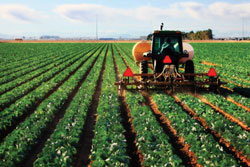
In today’s fast-paced world, the agricultural sector plays a crucial role in providing food security to billions of people. However, the industry has undergone significant transformations over the years, thanks to technological advancements and the emergence of agricultural engineering. In this comprehensive guide, we will delve into the fascinating field of agricultural engineering, from its origins to its modern-day applications. Join us on this journey as we uncover the key aspects of agricultural engineering.
Introduction to Agricultural Engineering
Agricultural engineering, often referred to as agri-engineering, is a specialized branch of engineering that focuses on applying engineering principles to agriculture. This field encompasses a wide range of topics, from designing and manufacturing agricultural machinery to optimizing farming practices for maximum productivity and sustainability.
Agricultural engineers are at the forefront of innovation in agriculture, working to develop solutions that address the unique challenges faced by farmers and the agricultural industry as a whole.
Historical Evolution of Agricultural Engineering
The roots of agricultural engineering can be traced back to ancient civilizations where basic tools and techniques were developed to improve agricultural practices. Over time, agricultural engineering evolved significantly, especially during the Industrial Revolution when mechanization revolutionized farming.
The Role of Agricultural Engineers
Agricultural engineers play a multifaceted role in the agricultural sector. They are responsible for designing and maintaining farm equipment, developing irrigation systems, and ensuring that agricultural practices are sustainable and environmentally friendly.
Education and Training in Agricultural Engineering
To become an agricultural engineer, one typically requires a bachelor’s degree in agricultural engineering or a related field. This education equips individuals with the knowledge and skills needed to tackle the complex challenges of modern agriculture.
Agricultural Machinery and Equipment
One of the cornerstones of agricultural engineering is the design and development of machinery and equipment that can significantly increase farming efficiency. These include tractors, harvesters, and crop processing machinery.
Precision Agriculture
Precision agriculture is a cutting-edge approach that involves using technology to optimize every aspect of farming. This includes data-driven decision-making, GPS-guided machinery, and sensor technologies to monitor crop health.
Biotechnology in Agriculture
Biotechnology has made remarkable contributions to agriculture, from genetically modified crops that resist pests to innovations in crop breeding techniques. Agricultural engineers often work in tandem with biotechnologists to develop these advancements.
Irrigation and Water Management
Efficient water management is critical in agriculture. Agricultural engineers design irrigation systems that help conserve water while ensuring that crops receive the necessary hydration.
Sustainable Farming Practices
Sustainability is a top priority in modern agriculture. Agricultural engineers focus on developing practices that reduce environmental impact, promote soil health, and conserve natural resources.
Challenges in Agricultural Engineering
Agricultural engineers face various challenges, including climate change, population growth, and the need for increased food production. Finding innovative solutions to these challenges is a key aspect of their work.
Future Trends in Agricultural Engineering
The future of agricultural engineering holds exciting prospects. As technology continues to advance, we can expect further automation, AI-driven farming, and more sustainable practices.
Impact on Food Production
The contributions of agricultural engineering are significant, as they directly impact food production. By increasing efficiency and sustainability, this field plays a pivotal role in feeding the world’s population.
Environmental Sustainability
Agricultural engineering contributes to environmental sustainability by reducing the use of harmful chemicals, conserving water, and minimizing soil erosion.
The Global Significance of Agricultural Engineering
Agricultural engineering is not limited to a single region; it has global significance. Innovations in this field have the potential to address food shortages and promote economic development worldwide.
Conclusion
In conclusion, agricultural engineering is a dynamic field that continues to shape the future of farming. From ancient tools to cutting-edge technology, this discipline has come a long way. As we face the challenges of the 21st century, agricultural engineers will play a pivotal role in ensuring a sustainable and abundant food supply for all.